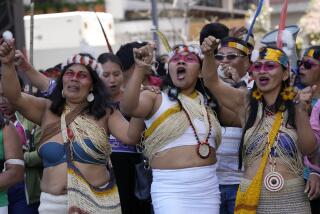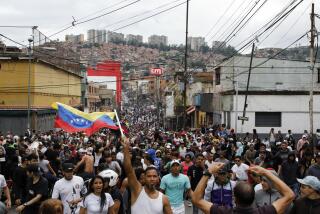Bolivians OK Gas Referendum
- Share via
LA PAZ, Bolivia — Voters approved a referendum Sunday that places new controls on the export and sale of Bolivia’s most lucrative resource, natural gas, in an important victory for an interim president struggling to cope with this Andean nation’s deep ethnic and social divisions.
Despite Indian leaders’ calls for a boycott, and others’ threats of militant action to stop the vote, Bolivian officials said the election proceeded with few incidents. About 60% of the country’s 4.5 million registered voters cast ballots.
“I think we can say, with our heads held high, that this is a July 18 the country will be proud of,” President Carlos Mesa said as he voted. “None of the announced storms was able to stop the democratic impulse of an entire nation.”
Mesa took over from ousted President Gonzalo Sanchez de Lozada in October, after a massive uprising of Aymara and Quechua Indians against a government plan to export gas through neighboring Chile, Bolivia’s historic rival. Sanchez de Lozada privatized the natural gas industry in the 1990s.
A new generation of Bolivian Indian leaders argued that Sanchez de Lozada’s policies would benefit foreign corporations and rich local investors at the expense of the nation’s impoverished majority.
In Sunday’s referendum, voters moved to reestablish the national oil and gas company, YPFB, and formally declared the gas reserves government property. The referendum, however, stopped short of nationalizing the industry. Mesa has said contracts with foreign companies, including Repsol YPF and BP Amoco, would be respected.
The referendum consisted of five questions, most of which were winning by large margins, according to official but incomplete returns. The balloting was close on only one question, which asked whether Mesa should use potential gas exports as a bargaining chip in negotiations with Chile over landlocked Bolivia’s desire for a Pacific seaport.
“The five questions have been answered, each one with a yes,” Mesa said Sunday night.
The referendum was opposed by leaders who said that it did not go far enough and that the natural gas industry should be nationalized, a step taken twice before in Bolivian history. Standard Oil’s holdings here were confiscated in 1937 and Gulf Oil’s in 1969.
Valued at $70 billion, Bolivia’s natural gas reserves are second on the continent only to Venezuela’s.
Alvaro Garcia Linera, a political scientist here, said that the vote would give “institutional legitimacy” to Mesa, an author and journalist without political party affiliations who was Sanchez de Lozada’s vice president. If the referendum had been defeated, Mesa would probably have been forced to resign, the analyst said.
Instead, the result was “a call to moderation” from the Bolivian people, Garcia Linera said. Many have grown tired of repeated strikes and highway barricades by urban and peasant unions that have become a feature of daily life here.
There were only scattered reports of unrest Sunday. Associated Press reported that election observers from the Organization of American States were pelted with stones in El Alto, an impoverished La Paz suburb that was a hotbed of the October rebellion.
Roberto de la Cruz, an Indian leader in El Alto, spoiled his ballot by only writing “nationalization” across it. “This is a day of democratic resistance,” he told reporters.
In the Aymara town of Achacachi, northwest of La Paz, demonstrators set off dynamite, but no injuries were reported.
*
Times staff writer Tobar reported from Los Angeles and special correspondent Ordonez from La Paz.
More to Read
Sign up for Essential California
The most important California stories and recommendations in your inbox every morning.
You may occasionally receive promotional content from the Los Angeles Times.














